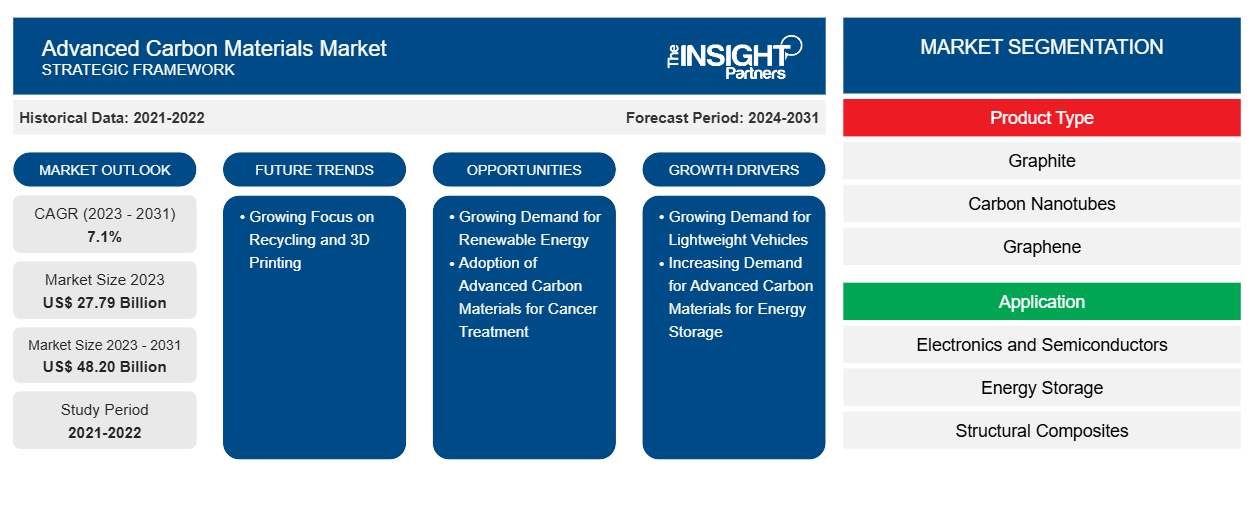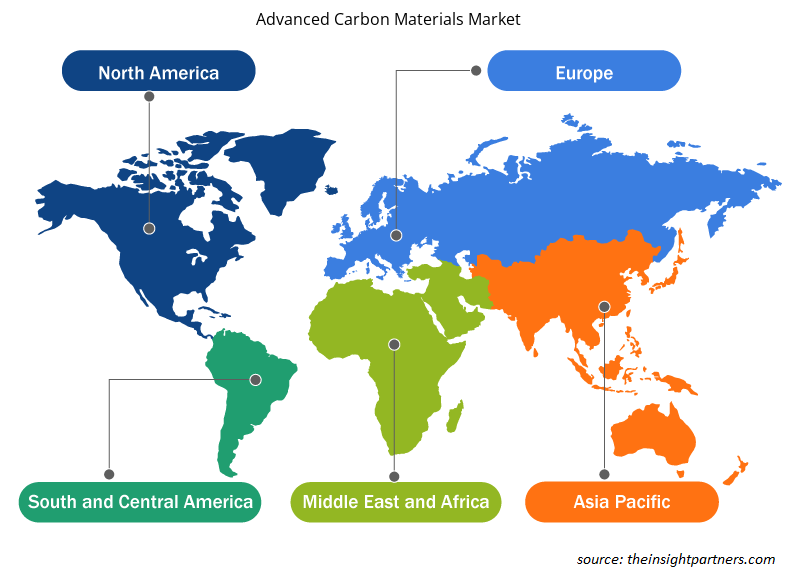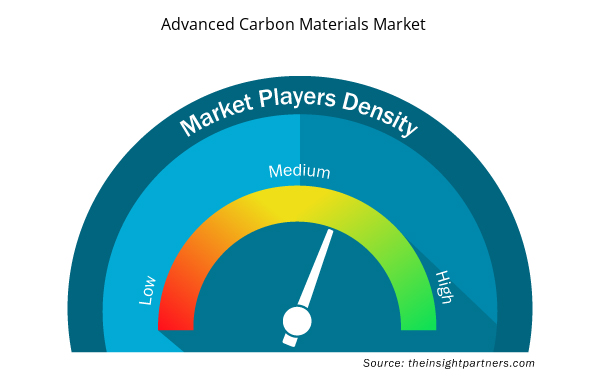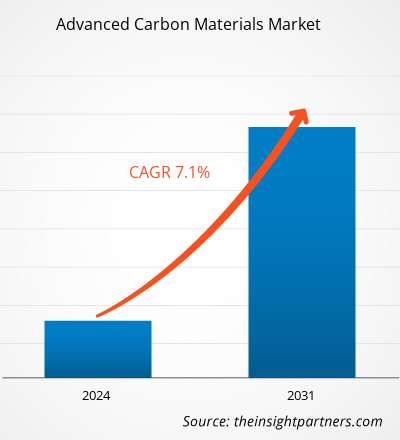The advanced carbon materials market size is projected to reach US$ 48.20 billion by 2031 from US$ 27.79 billion in 2023; the market is expected to register a CAGR of 7.1% during 2023–2031. The growing focus on recycling and 3D printing is expected to be a key trend in the market.
Advanced Carbon Materials Market Analysis
Asia Pacific held the largest share of the global advanced carbon materials market, and Europe is expected to grow at the fastest CAGR during the forecast period. The growing energy storage and structural composites industries are boosting the demand for advanced carbon materials in the European market. The structural composites industry in Europe is experiencing substantial growth attributed to the growing demand from automotive and construction & infrastructure sectors. Additionally, the region has several ongoing offshore and onshore wind energy projects that drive the demand for wind turbine blades.
Advanced Carbon Materials Market Overview
Advanced carbon materials include natural graphite, synthetic graphite, multi-walled carbon nanotubes, single-walled carbon nanotubes, graphene, PAN-based carbon fibers, PITCH-based carbon fibers, carbon foams, and fullerene. These advanced carbon materials are considered as backbone of engineering and scientific innovation owing to their versatile chemical, physical, and electrical properties. Graphite is one of the major advanced carbon materials used in various applications. Graphite can operate at extremely high temperatures, making it suitable for demanding applications such as sintering and debinding in furnaces. Its chemical inertness enhances its stability and resistance to corrosion, which is crucial in melting processes. Further, these advanced carbon materials are used in various applications, such as electronics and semiconductors, energy storage, structural composites, chemical materials and polymers, and medical.
The major factors driving the growth of the advanced carbon materials market are the growing demand for lightweight materials and the increasing demand for advanced carbon materials for energy storage applications. Further, the adoption of carbon-based materials in cancer treatment can create lucrative growth opportunities for the advanced carbon materials market during the forecast period.
Customize This Report To Suit Your Requirement
You will get customization on any report - free of charge - including parts of this report, or country-level analysis, Excel Data pack, as well as avail great offers and discounts for start-ups & universities
Advanced Carbon Materials Market: Strategic Insights

- Get Top Key Market Trends of this report.This FREE sample will include data analysis, ranging from market trends to estimates and forecasts.
Customize This Report To Suit Your Requirement
You will get customization on any report - free of charge - including parts of this report, or country-level analysis, Excel Data pack, as well as avail great offers and discounts for start-ups & universities
Advanced Carbon Materials Market: Strategic Insights

- Get Top Key Market Trends of this report.This FREE sample will include data analysis, ranging from market trends to estimates and forecasts.
Advanced Carbon Materials Market Drivers and Opportunities
Growing Demand for Lightweight Materials
In the automotive and aerospace industries, stringent regulations on fuel efficiency and emissions have led manufacturers to seek materials that reduce the weight of vehicles and aircraft without compromising safety or performance. For instance, carbon fiber reinforced polymers (CFRP) are increasingly being used in constructing aircraft fuselage, car body panels, and other critical components. Integrating carbon fiber in aerospace components can reduce drag and fuel consumption by up to 5%. These materials can be up to five times stronger than steel while being significantly lighter, helping to reduce the overall weight of vehicles and aircraft.
Automotive manufacturers prefer lightweight materials for manufacturing automobiles while ensuring safety and performance. Lightweight materials have excellent potential for increasing fuel efficiency. A 10% decrease in vehicle weight can result in a 6–8% enhancement in fuel economy. Substituting cast iron and traditional steel components with lightweight materials such as high-strength steel, aluminum alloys, magnesium alloys, carbon fiber, and polymer composites can reduce the weight of a vehicle body, thereby reducing the fuel consumption of a vehicle. Carbon fiber is significantly stronger than traditional materials such as aluminum and weighs about 40% less. The application of composites in the automotive sector continues to grow. Plastic composites have excellent acoustic and thermal properties compared to composites of nonrenewable origin, making them ideal for the vehicle's interior parts. The construction industry also benefits from the demand for advanced carbon materials. Carbon fibers and graphene are being incorporated into building materials to create lightweight, strong, and durable structures. These materials not only reduce the weight of buildings but also improve their energy efficiency and sustainability. Thus, the growing demand for lightweight materials across various industries is accelerating the adoption of advanced carbon materials. Their unique combination of lightweight, strength, and versatility makes them indispensable in meeting the evolving needs of industries focused on improving performance, reducing emissions, and enhancing sustainability.
Growing Demand for Renewable Energy
Clean (renewable) energy has gained momentum as nonrenewable energy resources are aggressively depleting. Many countries are focusing on generating clean energy to reduce carbon footprints. As global efforts to transition away from fossil fuels intensify, renewable energy sources such as solar, wind, and hydropower have become increasingly important. However, these energy sources face challenges, particularly in terms of storage and efficiency. Advanced carbon materials such as graphite, CNTs, and graphene are being increasingly adopted to address these challenges, as these materials play a critical role in improving the performance of energy storage systems, energy transmission, and overall renewable energy infrastructure. According to the International Energy Agency, the cumulative renewable electricity capacity by wind surged from 825.1 gigawatts (GW) in 2021 to 1,255.9 GW in 2024. Similarly, the cumulative renewable electricity capacity of solar PV increased from 949.0 GW in 2021 to 1,954.6 GW in 2024.
Advanced Carbon Materials Market Report Segmentation Analysis
Key segments that contributed to the derivation of the advanced carbon materials market analysis are product type and application.
- Based on product type, the advanced carbon materials market is segmented into graphite, graphene, carbon fibers, carbon foams, and others.
- By application, the market is divided into electronics and semiconductors, energy storage, structural composites, chemical materials and polymers, medical, and others.
Advanced Carbon Materials Market Share Analysis by Geography
The geographic scope of the advanced carbon materials market report is mainly divided into five regions: North America, Asia Pacific, Europe, Middle East & Africa, and South & Central America.
Europe is expected to dominate the market over the forecast period. The structural composites industry in Europe is experiencing substantial growth attributed to the growing demand from automotive and construction & infrastructure sectors. According to the European Parliament, the automotive sector in the European Union (EU) accounted for 8% of the European manufacturing sector in 2023. A total of 255 automotive production facilities produced 14.8 million vehicles, including 12.2 million cars, as of 2023. In addition, the EU announced a target of all new vehicles in the region must be zero-emissions by 2035. This further drives the demand for lightweight automobiles in the region. Additionally, the region has several ongoing offshore and onshore wind energy projects that drive the demand for wind turbine blades.
Furthermore, the energy storage industry is growing rapidly in the region. According to the European Association for Storage of Energy, in 2023, the region installed ~10.1 gigawatts of energy storage in non-EU countries and the EU across commercial and residential markets, compared to 4.5 gigawatts of energy storage in the previous year. Thus, the growing energy storage and structural composites industries further boost the demand for advanced carbon materials in Europe.
Advanced Carbon Materials Market Regional Insights
The regional trends and factors influencing the Advanced Carbon Materials Market throughout the forecast period have been thoroughly explained by the analysts at Insight Partners. This section also discusses Advanced Carbon Materials Market segments and geography across North America, Europe, Asia Pacific, Middle East and Africa, and South and Central America.

- Get the Regional Specific Data for Advanced Carbon Materials Market
Advanced Carbon Materials Market Report Scope
| Report Attribute | Details |
|---|---|
| Market size in 2023 | US$ 27.79 Billion |
| Market Size by 2031 | US$ 48.20 Billion |
| Global CAGR (2023 - 2031) | 7.1% |
| Historical Data | 2021-2022 |
| Forecast period | 2024-2031 |
| Segments Covered |
By Product Type
|
| Regions and Countries Covered | North America
|
| Market leaders and key company profiles |
Advanced Carbon Materials Market Players Density: Understanding Its Impact on Business Dynamics
The Advanced Carbon Materials Market market is growing rapidly, driven by increasing end-user demand due to factors such as evolving consumer preferences, technological advancements, and greater awareness of the product's benefits. As demand rises, businesses are expanding their offerings, innovating to meet consumer needs, and capitalizing on emerging trends, which further fuels market growth.
Market players density refers to the distribution of firms or companies operating within a particular market or industry. It indicates how many competitors (market players) are present in a given market space relative to its size or total market value.
Major Companies operating in the Advanced Carbon Materials Market are:
- Nanocyl SA
- Teijin Ltd
- Arkema SA
- LG Chem Ltd
- Cabot Corp
- Kumho Petrochemical Co Ltd
Disclaimer: The companies listed above are not ranked in any particular order.

- Get the Advanced Carbon Materials Market top key players overview
Advanced Carbon Materials Market News and Recent Developments
The advanced carbon materials market is evaluated by gathering qualitative and quantitative data from primary and secondary research, which includes important corporate publications, association data, and databases. A few of the developments in the advanced carbon materials market are listed below:
- LG Chem began constructing its fourth carbon nanotube (CNT) plant at its Daesan Complex, 80 km southwest of Seoul. LG Chem's CNT 4 Plant is slated for operation in 2025 and is expected to contribute to doubling LG Chem's annual CNT production capability to 6,100 metric tons. (LG Chem, News, 2024)
- Kumho Petrochemical Co Ltd announced that the company had signed an MOU with SK geo centric and Tongsuh Petrochemical for the establishment of a sustainable bio-raw material supply chain. (Kumho Petrochemical Co Ltd, Company Website, 2024)
Advanced Carbon Materials Market Report Coverage and Deliverables
The "Advanced Carbon Materials Market Size and Forecast (2021–2031)" report provides a detailed analysis of the market covering below areas:
- Advanced carbon materials market size and forecast for all the key market segments covered under the scope
- Advanced carbon materials market trends, as well as market dynamics such as drivers, restraints, and key opportunities
- Detailed Porter's Five Forces and SWOT analysis
- Advanced carbon materials market analysis covering key market trends, country framework, major players, regulations, and recent market developments.
- Industry landscape and competition analysis covering market concentration, heat map analysis, prominent players, and recent developments in the advanced carbon materials market
- Detailed company profiles
- Historical Analysis (2 Years), Base Year, Forecast (7 Years) with CAGR
- PEST and SWOT Analysis
- Market Size Value / Volume - Global, Regional, Country
- Industry and Competitive Landscape
- Excel Dataset


- Real-Time Location Systems Market
- Surgical Gowns Market
- Drain Cleaning Equipment Market
- Asset Integrity Management Market
- Cosmetic Bioactive Ingredients Market
- Water Pipeline Leak Detection System Market
- Artificial Intelligence in Healthcare Diagnosis Market
- Energy Recovery Ventilator Market
- Piling Machines Market
- Identity Verification Market

Report Coverage
Revenue forecast, Company Analysis, Industry landscape, Growth factors, and Trends

Segment Covered
This text is related
to segments covered.

Regional Scope
North America, Europe, Asia Pacific, Middle East & Africa, South & Central America

Country Scope
This text is related
to country scope.
Frequently Asked Questions
Growing demand for lightweight materials and increasing demand for advanced carbon materials for energy storage applications are driving the market.
The growing focus on recycling and 3D printing is expected to emerge as a future trend in the market.
The market is expected to register a CAGR of 7.1% during 2023–2031.
Nanocyl SA, Teijin Ltd, Arkema SA, LG Chem Ltd, Cabot Corp, Kumho Petrochemical Co Ltd, Tokyo Chemical Industry Co Ltd, Nanoshel LLC, Zeon Corp, Mitsubishi Chemical Carbon Fiber and Composites Inc, Resonac Holdings Corp, Huntsman International LLC, OCSiAl, and Sumitomo Chemical Co Ltd. are among the key players operating in the advanced carbon materials market.
The graphite segment held the largest share of the global advanced carbon materials market in 2023.
In 2023, Asia Pacific held the largest share of the global advanced carbon materials market due to increasing offshore wind installation projects in the region.
Trends and growth analysis reports related to Chemicals and Materials : READ MORE..
The List of Companies - Advanced Carbon Materials Market
- Nanocyl SA
- Teijin Ltd
- Arkema SA
- LG Chem Ltd
- Cabot Corp
- Kumho Petrochemical Co Ltd
- Tokyo Chemical Industry Co Ltd
- Nanoshel LLC
- Zeon Corp
- Mitsubishi Chemical Carbon Fiber and Composites Inc
- Resonac Holdings Corp
- Huntsman International LLC
- OCSiAl
- Sumitomo Chemical Co Ltd
- MOLCHEM

 Get Free Sample For
Get Free Sample For